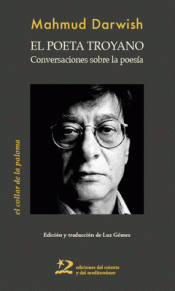Para envío
En estos tiempos de desmemoria histórica, nos ha parecido conveniente reeditar Memoria para el olvido, en que el poeta palestino rememora el cerco y destrucción de Beirut por el ejército israelí, acontecimientos que el escritor judío marroquí Edmond El Maleh, relacionando aquellos hechos con la reciente ocupación de los territorios autónomos palestinos, en que Darwish ha visto su casa y las instituciones en que colaboraba, el Centro de Arte Khalil Sakakini y la Casa de la Poesía, destruidas y saquedas, comenta en su Presentación "El poeta enclaustrado en Ramala": "Por un trágico y pavoroso retorno de las cosas, de nuevo la repetición de la agresión israelí al Líbano, el asedio a Beirut por el Tsahal. De nuevo y, como entonces, a las órdenes de Ariel Sharon".
«Mahmud Darwish ha escrito una novela en la que la poesía -insumergible- flota sobre el vertiginoso torrente de la narración, pero empapándose y dejándose llevar por él? La traducción -de Manuel Feria- es admirable».
Miguel Sáenz, «De la poesía del olvido», Revista de libros, 1998
«Darwish canta con todo su desespero y su corazón el feroz destino de los suyos, condenados a no tener un país refugio ni, por supuesto, su propio país. Aunque ha llovido desde 1982, los acontecimientos de 1997 hacen de este texto un documento moral prodigioso por su lucidez. Y, desde el punto de vista literario, la lucidez se transmuta elegantemente en delirio de lenguaje. Por ambos conceptos, una memoria inolvidable».
Miguel Bayón, «Crónica desgarrada sobre los palestinos», El País-Babelia, 10/5/97
«Es la semblanza de una generación nacida entre dos negaciones: la de no poder volver a un país que nunca conoció y la de ser de ningún lugar. Un pueblo que en cualquier sitio está de más, sin que por ello deje de ser dueño de una identidad más allá del instinto de supervivencia, y que nunca creyó que la derrota fuese irremediable».
Valentín Cárdenas, Lateral, mayo 1997
«?historia de un grito sin eco, de una migración masiva y forzada de unos pájaros heridos. Es la historia de la hemorragia colectiva de todo un pueblo que dio lugar a la hemoptisis de sus pensadores. Es la historia de un ser mítico que debería quitar el sueño a los monstruos que provocaron el genocidio de Oriente Medio. Es la historia de la "palestinidad" Darwish da cuenta de todo lo ocurrido, se hace eco de la memoria palestina, negándole la voz al olvido».
Deissem Ghanem, «Beirut, 1982», Clarín, 1997
«A pesar del miedo, del terror, de los escombros, de los aviones israelíes arrojando su fuego y mortífero hierro, el poeta no se arredra y da lugar a unos encadenados pensamientos? sumergidos en lo más hondo de lo humano».
Iñaki Urdanibia, «Beirut, agosto de 1982», Igandegin, 8/6/1997



